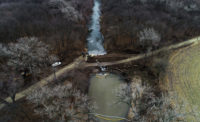A controversial decision to cancel the 15-20 month shutdown of New York City’s L train subway between Manhattan and Brooklyn to repair an East River tunnel damaged by Superstorm Sandy in 2012—a plan several years in the making by the Metropolitan Transportation Authority—is based on an alternative fix sought by Gov. Andrew Cuomo (D).
It was developed just in the last month by engineer-educators at Columbia and Cornell universities.
While the plan was set for MTA board discussion at its regular monthly meeting on Jan. 24, the agency announced Jan. 12 it will hold an emergency board meeting on Jan. 15 at 12:00 p.m. to address issues in the alternative fix.
At the meeting, open to the public, the project's design consultant WSP will brief board members on the alternative plan.
"WSP has studied the proposed design alternatives and the preliminary new construction schedule developed by the construction manager," said MTA. "WSP will be recommending to the board that it pursue the modified plan as a better alternative, as it does not require a total shutdown of L train service."
WSP and its unit Parsons Brinckerhoff also designed the original tunnel rehab plan.
The new proposed plan for the L train, which carries about 250,000 daily riders, will allow limited operation, Cuomo announced on Jan. 3.
The Canarsie tunnel was flooded with 7 million gallons of salt water, leaving two adjacent 7,100-foot-long sections of the tunnel with significant damage.
The academics, who Cuomo said worked “pro bono,” are Mary C. Boyce, dean of Columbia’s Fu Foundation School of Engineering and Applied Science; George Deodatis, chair of its civil engineering and engineering mechanics department; Andrew W. Smyth, Smart Cities Center chair at Columbia’s Data Science Institute; Peter Kinget, electrical engineering department chair; Lance R. Collins, dean of Cornell’s College of Engineering; and Thomas D. O’Rourke, a civil-environmental engineering professor at Cornell.
Their approach, used on new overseas transit systems and possibly in the U.S., employs a “racking system” to hang cables high on fiberglass-enclosed tunnel walls, rather than encased in concrete in low-lying "bench walls," where saltwater intrusion in the tunnel has damaged them.
MTA said the board also will discuss hiring a new consultant reporting directly to Acting MTA Chairman Fernando Ferrer and the board "to oversee operation, oversight and precautions" for the new alternative plan. According to a Bloomberg report on Jan. 13, that includes monitoring of silica dust that the new rehab plan is likely to generate.
The review also will cover the proposed alternative's cost, duration and its likely longevity, said The Wall Street Journal on Jan. 12, citing an interview with Ferrer.
MTA said also that "Amtrak expressed interest in undertaking a preliminary review of these methods to see if they could be applied to any portions of its own projects including the East River tunnels," with officials touring the Canarsie Tunnel on Jan. 11.
Media also speculated on the late December departure of John O’Grady, MTA senior vice president of capital program management, a 29-year agency veteran who was overseeing the Canarsie tunnel reconstruction, had led rehab of the storm-damaged Montague East River runnel and led other Sandy recovery efforts for the agency.
An agency official said he “retired” and was not forced out, local reports said.
But according to one former MTA manager who declined identification, O'Grady was "encouraged" to leave. "The whole thing was cooked in December," he said. "Everyone drank the kool-aid."

NYC Transit President Andy Byford told Curbed NY that the academics' plan would first be reviewed by "independent" New York-based engineers and safety experts who were not identified, but the Wall Street Journal report indicated that could be scrapped based on MTA's announcement.
Jacobs Engineering also was previously contracted to provide constructibility reviews on the original plan.
The original shutdown was set to begin in late April. It is not clear if the revised repair plan can stick to that date.
Also unclear is how an existing tunnel construction contract valued at about $477 million to a 70-30 joint venture of Judlau Contracting and TC Electric will be altered to fit the new approach.






Post a comment to this article
Report Abusive Comment